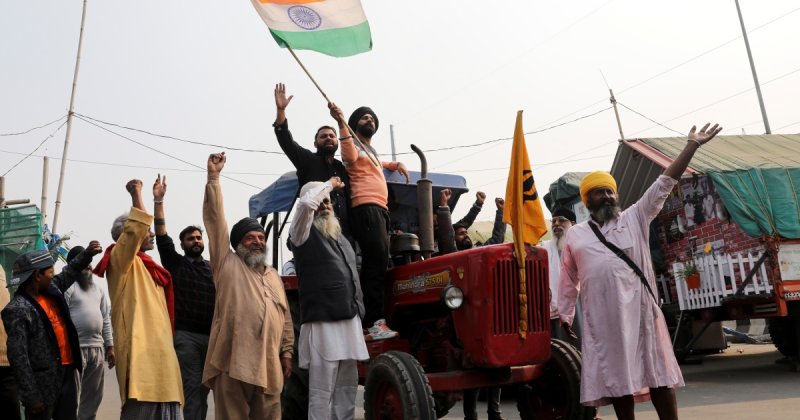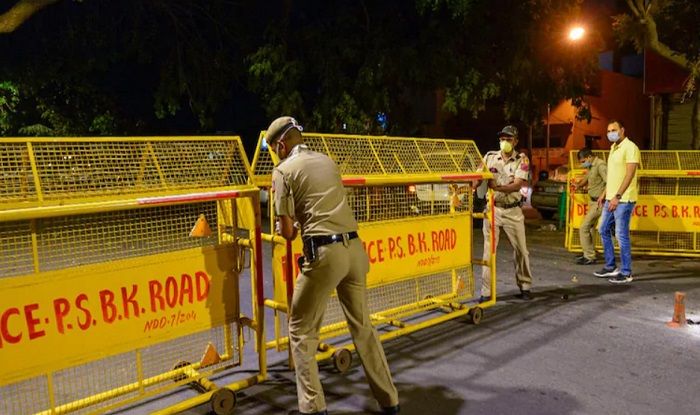
Farmers to return home after a year
- December 10, 2021
- 0
The Samyukta Kisan Morcha (SKM) – an amalgamation of various farmer unions spearheading the protests – announced “suspension” of the stir following a letter from the Union agriculture ministry on all the points of discord; it also assured to continue with the current system of minimum support price (MSP).
The foundation of ending the over year-long protest against the three farm Acts was laid on November 19 when Prime Minister Naredra Modi announced the repeal of the laws in a televised address on the occasion of Gurupurab.
The prime minister had also announced the formation of a committee comprising representatives from the Centre, states, agriculture experts, and farmer unions to make the MSP mechanism effective. Thereafter, the government moved quickly to first get legislation to repeal the Acts passed from the Cabinet and then approved by both houses of parliament.
The Acts-which were brought with much fanfare as part of the ‘Atmanirbhar Bharat’ package in June 2020 after the Covid-induced lockdown were mired in controversy, with a section of farmers seeing them as an assault on the MSP-based procurement system; many others felt that the move will deal a body blow to the current APMCs. Farmers also alleged that the Acts were a way open the door for big corporations to get into farming. Several states, such as Punjab, have been against the laws because they infringed on the state’s
Power of the three repealed Acts, the first-farmers produce trade and commerce (Promotion and Facilitation) Act, 2020- sought to provide an ecosystem for farmers and traders to sell and buy outside designated mandis, without disturbing the existing mandi structure. This was planned by categorizing the entire area outside the mandi as a trade area.
A designated mandi is a regulated wholesale market that is governed by the rules of the state where it is situated.
The markets are called APMCs (Agricultural Produce Marketing Committees) and are governed by an Act. Studies show India has around 8,000 such regulated markets and 22,000 sub-markets, which are governed by some sort of regulations.
एक वर्ष के बाद किसानों की वापसी
तीन कृषि कानूनों के विरोध में दिल्ली की सीमाओं पर एक साल से भी ज्यादा समय से चल रहा किसान आंदोलन खत्म होने जा रहा है। किसान संगठनों ने 11 दिसंबर से देश में सभी जगह प्रदर्शन बंद करने का ऐलान किया है। विवाद की जड़ रहे तीनों कृषि कानून पहले ही खत्म किए जा चुके हैं। संयुक्त किसान मोर्चा (एसकेएम) ने सभी बिंदुओं पर सरकार से चिट्टी मिलने और न्यूनतम समर्थन मूल्य की मौजूदा व्यवस्था जारी रखने के भरोसे के बाद ही प्रदर्शन समाप्त करने की घोषणा की।
साल भर से चल रहे किसान आंदोलन को समाप्त करने की बुनियाद तभी रख गई थी, जब 19 नवंबर को प्रधानमंत्री नरेंद्र मोदी ने तीनों कृषि कानून वापस लेने का ऐलान किया था। मोदी ने अपने संबोधन में एमएसपी को प्रभावी बनाने के लिए केंद्र, राज्य, कृषि विशेषज्ञों और किसान संगठनों के प्रतिनिधियों वाली एक समिति गठित करने की भी घोषणा की थी।
कोविड की पहली लहर के दौरान लॉकडाउन के बीच जून, 2020 में ये कानून आत्मनिर्भर भारत पैकेज के तहत लाए गए थे। मगर शुरू से ही किसानों का एक वर्ग इनका विरोध कर रहा था। किसानों का मानना था कि इससे एमएसपी व्यवस्था खत्म हो जाएगी और कुछ का मानना था कि इससे कृषि खरीद विपणन समितियों को बड़ा झटका लगेगा। प्रदर्शनकारी किसानों का आरोप था कि इससे कृषि क्षेत्र में बड़ी कंपनियों का दखल हो जाएगा। पंजाब जैसे राज्य भी इसका विरोध कर रहे थे। उनका कहना था कि इससे राज्य की शक्तियां कम होंगी।
निरस्त हो चुके तीन कानूनों में से पहला कानून था कृषि उपज व्यापार एवं वाणिज्य (संवद्र्घन एवं सुविधा) अधिनियम, 2020। इसके तहत किसानों और व्यापारियों को निर्धारित मंडियों से बाहर बिना किसी कर या शुल्क के कृषि उपज की खरीद-बिक्री करने की अनुमति दी गई थी। इस कानून के जरिये किसान देश भर में कहीं भी अपनी उपज बेच सकते थे। दूसरा कानून था मूल्य वायदा और कृषि सेवा पर किसान (सशक्तीकरण एवं सुरक्षा) समझौता कानून और तीसरा मौजूदा आवश्यक जिंस कानून में संशोधन था। दूसरे कानून को अनुबंध कृषि कानून भी कहा जाता है, जिसके तहत किसानों और खरीदार के बीच ठेके पर खेती की व्यवस्था दी गई थी।

![]()
![]()
































































